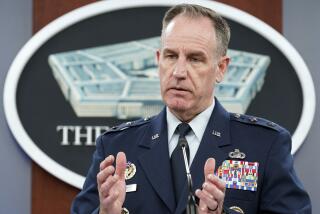Officials Admit Deficiency in POW Effort : Vietnam: But allegations of a cover-up to hide evidence of troops left behind are called ‘absurd.’
- Share via
WASHINGTON — Efforts to determine the fate of Americans missing in Southeast Asia were understaffed, poorly funded and plagued by bureaucratic ineptitude during the first 10 years after the Vietnam War, current and former Pentagon officials conceded Tuesday.
But allegations of a cover-up to hide evidence of POWs left behind in Vietnam and Laos--charges often leveled by POW-MIA activists and family groups--are “absurd and insulting,” Gen. James Clapper, director of the Pentagon’s Defense Intelligence Agency, told the Senate Select Committee on POW-MIA Affairs.
The “low priority” given to the POW-MIA issue from 1973 to 1983 made the increased efforts in the mid-1980s to account for the missing “much less productive than they should have been,” added retired Rear Adm. Thomas A. Brooks, a former head of the intelligence agency’s POW-MIA office. In many cases involving reported POW sightings, the “trail had long grown cold,” he said.
Brooks, author of a 1985 memo that was highly critical of the intelligence agency’s accounting efforts, said that records were “very badly kept” and the nine or 10 analysts assigned to the POW office were “frustrated by . . . bureaucratic ineptitude” and a lack of resources.
But agreeing with Clapper, Brooks and other critics of the Pentagon’s accounting efforts also told the committee that allegations of a conspiracy to withhold information are “absolutely untrue.”
Entering its final week of hearings, the Senate committee plans to wrap up its 15-month investigation by examining past and present Pentagon efforts to account for the 2,226 military personnel still listed as missing in Vietnam and Laos.
A final report is due by the year’s end, but deep divisions within the committee’s ranks are likely to prevent it from reaching unanimous conclusions about the key questions it was formed to answer: Were POWs left behind in the political rush to disengage from Vietnam, and, if so, could any of them still be alive today?
Seeking to stanch news reports about infighting among the members, Committee Chairman John Kerry (D-Mass.) opened Tuesday’s hearing by stressing that the committee is united in its desire to answer those questions.
But renewed criticism by two Republican panel members, Vice-Chairman Robert C. Smith of New Hampshire and Charles E. Grassley of Iowa, suggested that testy divisions persist over the intelligence agency’s performance.
Smith said that “hundreds of questions (have) yet to be answered” and accused the Bush Administration of withholding documents sought by the committee.
He also deplored a committee decision last week not to subpoena a former Secret Service agent who reportedly would testify that he was present when then-President Ronald Reagan and his national security aides discussed in January, 1981, a Vietnamese offer to ransom American POWs.
In a 7-4 vote, the committee accepted the Administration’s argument that compelling a Secret Service agent to testify about a conversation he overheard would set a precedent that could compromise the service’s ability to protect presidents.
More to Read
Sign up for Essential California
The most important California stories and recommendations in your inbox every morning.
You may occasionally receive promotional content from the Los Angeles Times.













